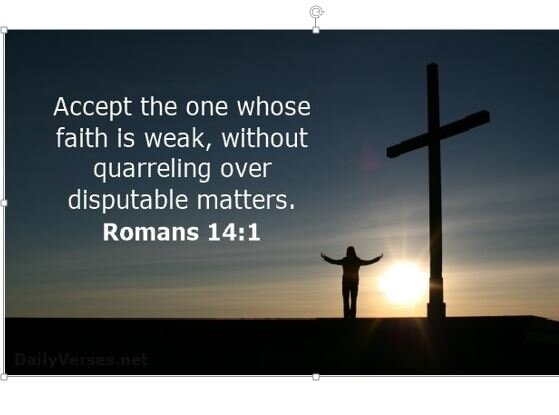Believers in the local church come from different backgrounds and have different personal convictions and different perspectives towards a variety of non-moral issues. The context of Romans 14 has been summarized by Dr. John MacArthur as follows:
The weak Jewish believer had difficulty abandoning the rites and prohibitions of the Old Covenant; he felt compelled to adhere to dietary laws, observe the Sabbath, and offer sacrifices in the temple. The weak Gentile believer had been steeped in pagan idolatry and it rituals; he felt that any contact with anything remotely related to his past, including eating meat that had been offered to a pagan deity and then sold in the marketplace, tainted him with sin. Both had very sensitive consciences in these areas, and were not yet mature enough to be free of those convictions.
The Apostle Paul was advocating for a spirit of Christian love and acceptance that would bind all believers together in the body of Christ without judging one another or treating one another with contempt because of these differences. This chapter offers tremendous insight into what brotherly love should look like in the local church. Rather than attempting an exposition of this chapter, we are going to cherry-pick:
10 Principles of Brotherly Love in the Church
-
Major on reception of your brother rather than on rejection — following the pattern of the acceptance shown by God (14:1, 3)
-
Avoid passing judgment on the personal convictions of others (14:1)
-
Don’t show contempt for the scruples of others (14:3)
-
Understand that both you and your brother are individually accountable to the Lord; you are not the master of your brother (14:4, 6-12)
-
Expect there to be differing perspectives and differing convictions in the local church (14:5)
-
Bathe your words and deeds in an attitude of thanksgiving towards God (14:6)
-
Determine not to put an obstacle or stumbling block in your brother’s way or anything that would destroy him or tear him down (14:13, 15)
-
Do not confuse a list of “Dos and Don’ts” with the reality of genuine life and fellowship in the kingdom of God (14:17)
-
Pursue the things that contribute to peaceful coexistence and edification in the bonds of fellowship in the church (14:19)
-
Allow your brother to live according to his faith and good conscience in his personal relationship with the Lord (14:22-23)

